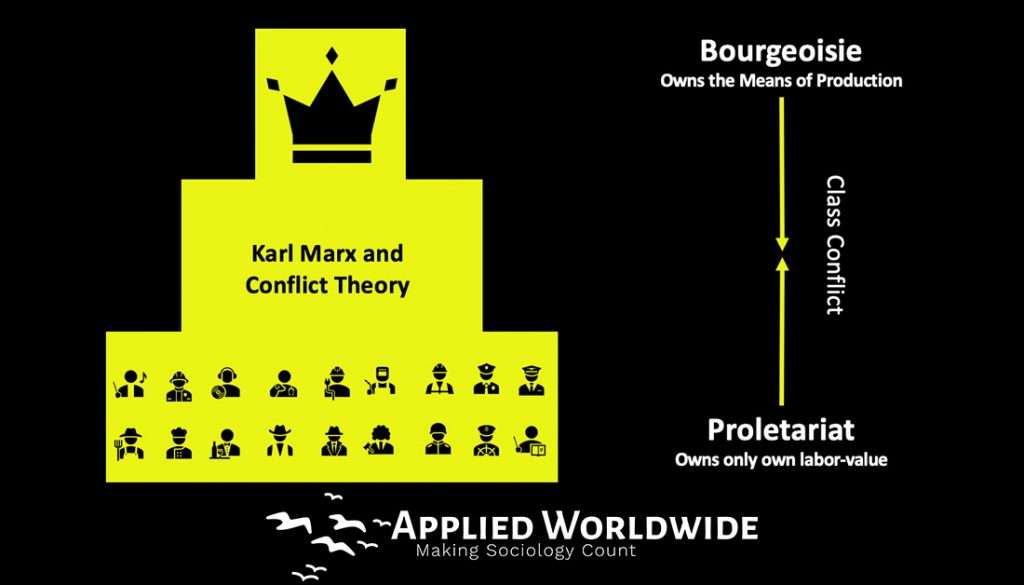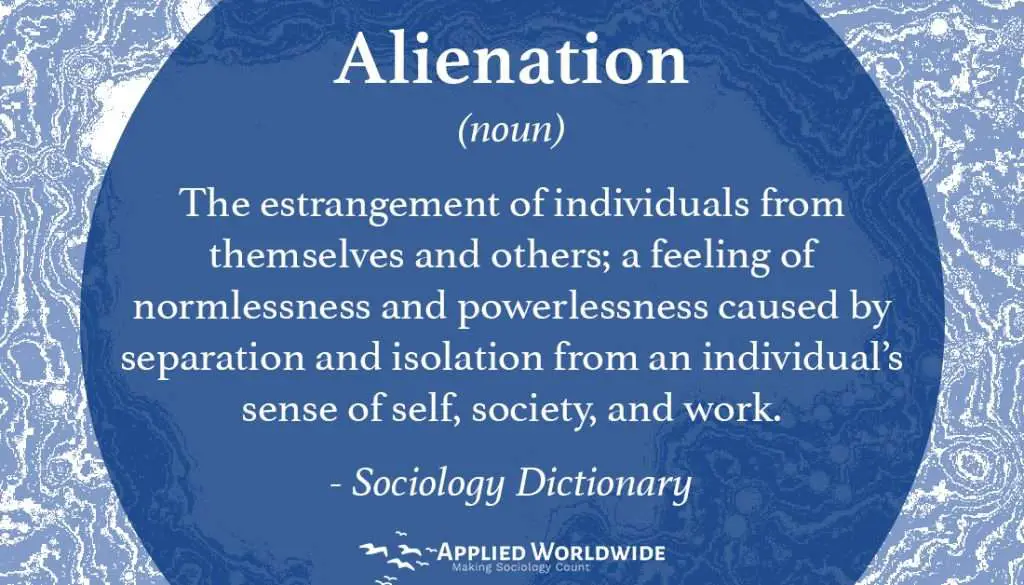What is the Definition of Alienation?
According to sociologists, the definition of alienation (noun) is “the estrangement of individuals from themselves and others; a feeling of normlessness and powerlessness caused by separation and isolation from an individual’s sense of self, society, and work.” But, beyond the definition what is alienation in sociology?
Definition of Alienation: What are Four Types of Alienation?
The Marxist term derives from the idea that workers (proletariat) are alienated by the economic structure of capitalism and the elite owners of capital (bourgeoisie). According to Marxist thought, capitalism leads to four types of alienation. The four types of alienation include:
- Alienation from other workers,
- Alienation from product of labor,
- Alienation for the process of labor, and
- Alienation from full human potential (self).
Alienation from Other Workers

In capitalist society, work efficiency is often important for maximizing production. One means of maximizing production is to keep workers on task by isolating them from one another. Sometimes this can be physically (structural isolation) or it can be a part of the organizational culture, where workers are discouraged from communal actions.
First, think about physical barriers that placed between workers at almost any workplace. Often, offices walls or portable dividers isolate professionals from each other. Other times, they may be placed in separate buildings. It will be interesting to find out if plastic barriers and facial coverings in the workplace during COVID-19 will be used as further structural divides. The point is we could probably look around any workplace environment and see ways in people are isolated from one another.
Next, consider workplace policies and norms. At times, workplace policies explicitly prohibit what kind of interactions people can have, which is another form of structurally separating workers. Maybe that means people with higher status positions do not form relationships with those with lower status positions. There also may be policies regarding how frequently or to whom folks can communicate with at work. In extreme conditions, people can be nearly excluded from communicating at work altogether.
Organizations also have less explicit means of alienating workers from one another, such as competition. Think about how a “Best Employee” or “Employee of the Month” program can change the dynamic of a work place. Now think if that came with a monetary incentive. Competition is likely to contribute to the estrangement of individuals from one another in the workplace.
Alienation from Product of Labor
Alienation from the product of labor is when workers are estranged or otherwise symbolically distant from that which their labor produces. The easiest demonstrations of alienation from the product of labor is in relation to global capitalism. Consider the following thought activity:
- Think about an American-specific holiday. The Fourth of July or Independence Day, may be the most symbolically ‘American’ holiday in the United States.
- Now, think about all of the Fourth of July related products that are bought and sold around late-June and early July. There are hats, flags, yard ornaments, party gifts, and a wide assortment of other holiday-themed decorations. Consider how many of those products are produced in another country such as China.
- Finally, think about the workers in a factory in China, who produce those goods.
To us in the United States, all of those products have a symbolic meaning. The products help us honor our national independence on a day where people collect in solidarity and celebration. To the workers in China, those goods likely do not share the same meaning. Therefore, you can see how the workers are estranged from the final outcome of the product of their labor.
Another example of alienation from the product of labor could be a domestic automobile plant that produces high-end or luxury cars. Think about automobiles that cost $150,000 or more. The workers in the factory and maybe even middle management are alienated from the product because they likely cannot afford to purchase the automobile. Therefore, these workers are estranged from the experience of using the product they work to produce.
Alienation from Process of Labor
In addition to being alienated from the products of our labor, we can also be alienated from the process of our labor. Marxist sociologists discuss this type of alienation as losing control over the activity of producing that product. How the activity of our labor is controlled in the production process is another way to think about this type of alienation.
One example of alienation from the process of one’s labor is standardized curriculum in education. While some educators—particularly those in higher education institutions—may have the freedom to design their curriculum to meet their own desires, most educators must teach a standardized curriculum. In the US, for example, public school educators are often alienated from the process of their teaching labor by having to teach to standardized tests, creating a focus on test scores rather than the teaching experience itself.
Certainly, there are teachers who can construct a better curriculum than the standard, but alienation from the process of labor removes any control over the process by the workers (teachers).
Alienation from Self
According to Marx and others capitalism produces a structure that limits workers from reaching their full human potential. Consider this logic: as individuals we are all a little different. We have some biological difference and learned differences. Within these differences we all have strengths—some things we are really good at, things we love doing, and other activities that just generally bring us fulfillment.
Alienation from self is the idea that capitalism prevents people from contributing to social causes that are not directly beneficial to the economy. Think about community activities that require labor but are unpaid or underpaid. Children’s coaches, museum and library staff, and other caretakers are often positions using volunteer labor. Consider all of the unpaid labor in childbirth and raising children.
Contributing to the community and raising children are generally skills that we would consider valuable to society, yet many people have to opt out of those opportunities in favor of paid work. For example, young women genuinely have to weigh the economic considerations before having children. The point is this form of alienation is people make decisions on what to do with their time based on economic outcomes, rather than what they truly desire to reach their full human potential.
Use and Definition of Alienation in Contemporary Sociology
Historically, ‘alienation’ in sociology was used to explicitly refer to economic relations. Contemporary sociologists use the term alienation similarly, but in different contexts. For example, sociologist, Chris Yuill, writes about “Capitalism, Alienation, and Health” for a 2005 study published in Social Theory & Health in which he applies alienation to the study of health inequalities.
Furthermore, sociologists Catherine E. Ross and John Mirowsky use the concept to investigate links between neighborhood disorder and mental health in their 2009 article titled “Neighborhood Disorder, Subjective Alienation, and Distress.” In this example, the authors specify the concept of alienation to discuss subjective alienation—defined as “the cognitive link between the social environment and psychological distress”—in the context of neighborhood disorder.
One sociologist, Karen Bettez Halnon, even applied the concept to the American music industry and the way it commodifies “alienated artists and their alienation experience” to turn alienation into a source of profit.
Since its conception, alienation has remained a concept that sociologists use in their research. A lot of current sociological research is concerned with inequality in various forms which uses concepts like alienation and other conflict theory related terms to make sense of that inequality.
Alienation in Public Sociology
Our very own contributor Yasin Azzariyan, writes about anomie and alienation in Iran for her article titled, Anomie and Alienation: Madness and the death of rationality. In this article, Azzariyan discusses the relationship between anomie and alienation while applying the concepts in a social commentary of Iran.
There are a variety of educational videos on YouTube and across the internet describing the concept of alienation. One that we believe is good because of its detail and brevity is a video titled Karl Marx on Alienation by BBC.
Final thoughts about the Definition of Alienation
It is difficult to understand the concept by simply reading the definition of alienation. Alienation is a theoretical concept dating back to the 1800s. Like many philosophical or theoretical concepts, especially from the time, alienation has complex meaning. I hope that by looking at four types of alienation, applying them to contemporary work environments and viewing other examples of alienation in sociological writing, this reading helps everyone understand the definition alienation a bit better.








